Winter can be challenging for runners. It can pressure you to stay inside and ruin your routine. Or it can be an opportunity to flex mental toughness and build physical strength by heading out in all sorts of weather. We choose the latter. Running in cold, rain, wind, or snow (or all of the above) can be downright fun—if you’re wearing the right gear. We tested a range of jackets meant to embrace winter, and these five came out on top.
At a Glance
- Best All-Around:
- Best Value:
- Best for Mild Climates:
- Best for Snow and Cold:
- Best for Trails and Travel:
- Other Products We Tested
- How to Choose a Winter Running Jacket
- How We Test
- Meet Our Testers
If you buy through our links, we may earn an affiliate commission. This supports our mission to get more people active and outside. Learn more.
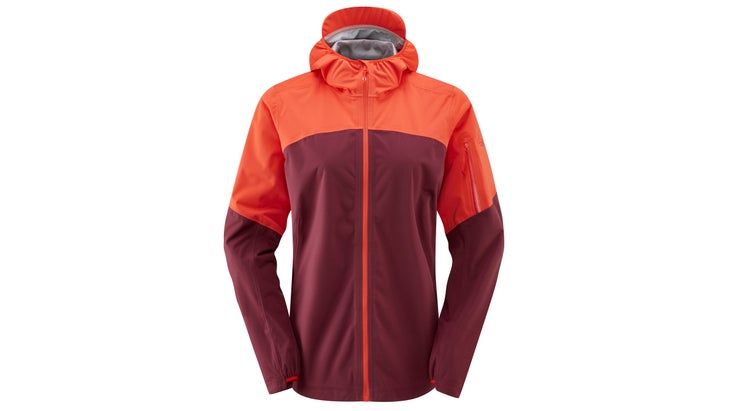
Best All-Around
Rab Kinetic Ultra Waterproof Jacket
Materials: 3-layer proprietary ProFlex recycled polyester with polyurethane coating
Sizing: XS-XL
Pros and Cons
⊕ Both waterproof and breathable in the ideal ratio for runners
⊕ Adjustable hood
⊗ No insulation (but rarely needed when running)
Anyone who plans on running outside all winter needs a waterproof, breathable jacket. This one from Rab withstood our testing in Colorado sleet, snow, and rain, easily shedding all three. While the 3-layer membrane is obviously less breathable than a permeable fleece, it is far more protective from moisture, and we didn’t overheat or become clammy. (Thank God: Sweat freezes if it can’t escape.) We also loved this jacket’s stretchiness, which allowed for full mobility and didn’t pull uncomfortably around our arms or shoulders. And we appreciated the attention to detail even in the small things, like the hood’s slight visor that added protection from the elements.
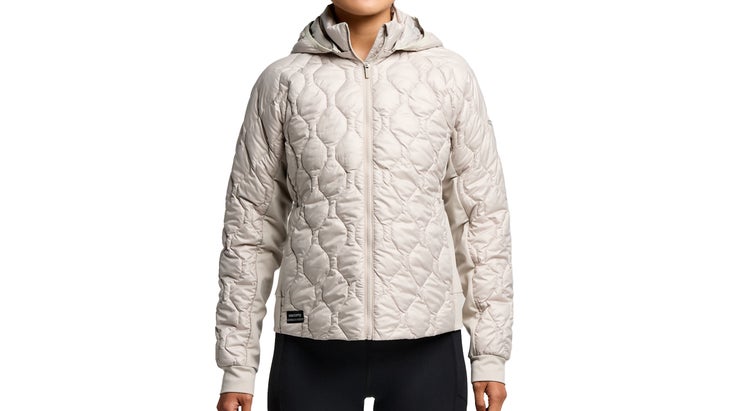
Best Value
Saucony Hurricane Insulated Jacket
Materials: 100% recycled polyester insulation, recycled polyester fleece panels
Sizing: XXS-XXL
Pros and Cons
⊕ Can be worn casually as well as during high-intensity running
⊕ Multiple pockets add functionality
⊕ Easy care: machine wash low, gentle dry cycle
⊗ Cut is a little short for some
⊗ Hood could fit more securely and is a bit noisy
While $200 might not sound like a bargain, this jacket is versatile enough to get your money’s worth. To start, the hood is removable, so you can wear the jacket in a range of weather conditions. We found this jacket also good-looking enough to wear around town as a cute outer layer. The zippered hand warmer pockets add functionality on that end.
For running, fleece paneling on the sides and lower back allows full breathability while wicking sweat, and the lightly insulated chest and upper back provide warmth and shed light snow. “I love this jacket,” gushed a tester. “I love the fit, the look, the material, how easy and well it washes, the fact that it has a hood, the soft and stretchy sleeve cuffs, and the pockets.”
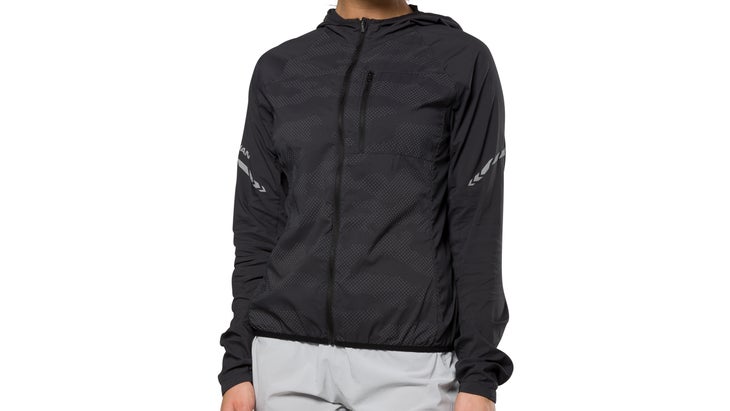
Best for Mild Climates
Nathan Sports HyperNight Stealth Jacket
Materials: Proprietary 2-way stretch UltraAire (100% nylon) with DWR finish
Sizing: XS-XL
Pros and Cons
⊕ Very breathable
⊕ Reflective detailing adds safety
⊕ Packs into its own pocket
⊗ Not waterproof
We love the feel of this jacket against our skin. Its lightweight, soft, wind-resistant material breathes like a champ, while a DWR coating protects from light wind and snow. “The material did not make me overheat, even during more intense runs,” says our Bay Area tester. The ventilated back panel, as well as the material itself, does a good job of letting heat escape. The jacket features two-way stretch for mobility and makes minimal noise on the run—there’s no annoying swoosh-swoosh or crinkling sound with every arm swing. The subtle camouflage print on the front torso and upper back becomes brightly reflective under illumination, such as headlights at dawn or dusk.
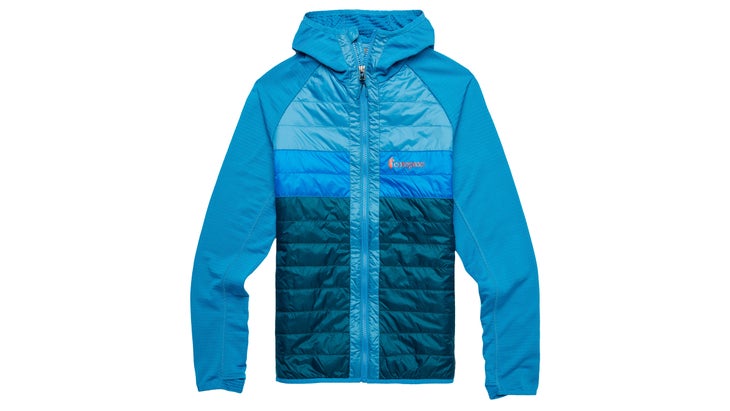
Best for Snow and Cold
Cotopaxi Capa Hybrid Insulated Hooded Jacket
Materials: Shell: 100% 20D ripstop nylon with PFC-free DWR finish, Liner: 97% polyester/3%spandex, Insulation: Recycled synthetic Primaloft Gold P.U.R.E.
Sizing: XXS-XXL
Pros and Cons
⊕ Hood fits well and stays put
⊕ Can be worn casually
⊕ Lifetime warranty and repairs
⊗ Not waterproof
⊗ Can feel damp in humid climates or for heavy sweaters
With lightly insulated, DWR-coated paneling around the torso that both warms and blocks wind, and waffle fleece on the shoulders, hood, and arms, the Capa Hybrid Jacket offers a combination of warmth, protection, and breathability—in the right conditions. We love it for cold, dry runs, outings with lightly falling snow, or during a crushing wind. The insulated panel can, however, feel warm during hard efforts in all-but-frigid temps.
Our East Coast-based tester preferred this jacket during vacation runs in the dry conditions of Joshua Tree over the humidity back home in Virginia, where she felt it made her “too sweaty.” Our testers in the Colorado Rockies and foothills praised the piece for protecting them during cold, snowy runs. The hood and thumbholes add coziness, and two zippered hand-warmer pockets help the jacket transition to casualwear. Bonus: We found the zippers easy to use even while wearing mittens.
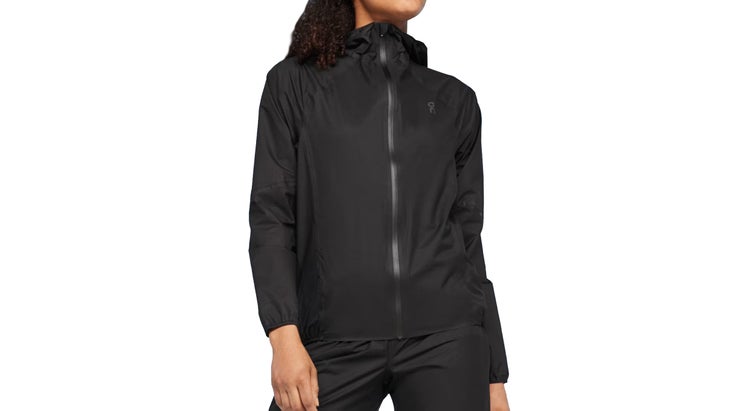
Best for Trails and Travel
On Running Ultra Jacket
Materials: Shell: 100% polyamide, Pocket mesh: 82% polyamide, 18% elastane
Sizing: XS-XXL
Pros and Cons
⊕ Can fit over a hydration pack
⊕ Very lightweight for a waterproof jacket
⊗ Loose fit can feel sloppy to some
Some may deem the relaxed fit of this jacket a negative, but we found it valuable. One Colorado tester noted how easily the jacket pulls over a running pack—the jacket even has two pleats sewn into the backside for this purpose—in a deluge or when she needed protection in a pinch from a cold wind on the ridge of an alpine trail. And since the jacket packs down tiny and weighs close to nothing (4 ounces), we see no reason not to shove it in a trail-running pack to have on hand in shifty weather.
The almost-oversized fit of this jacket joins its monochromatic styling to make it, dare we say, urban cool. And the 2.5-layer waterproof polyamide material wards off rain admirably; one tester stayed comfortable standing in a downpour to watch a race after finishing her own. Reflective logos and detailing add safety for city running, but its ability to pack down small and go with everything make it truly shine as a trail or travel jacket.
Other Products We Tested
- Smartwool Active Fleece Zip-up ($180) or Pullover ($160). Soft and comfortable, but a bit thick and permeable for all but the coldest, driest winter conditions. Great for around-town wear.
- Patagonia Wind Shield Jacket ($199). Blocks wind, but we craved more shape than the boxy fit, and the neck could be higher when zipped for more protection.
- Patagonia Houdini Jacket ($109). This is a great layer and has been for years. We went with the Nathan Sports HyperNight Stealth Jacket as our water-resistant pick because of its soft material and reflectivity.
- The North Face Summit Series Superior FUTURELITE Jacket ($300). This is a solid lightweight waterproof piece. The material is a tad stiff.
- The North Face Winter Warm Pro Jacket ($150). A warm hybrid jacket that we felt wasn’t as breathable as the Cotopaxi Capa Hybrid or Saucony Hurricane Insulated.
- Ciele VLV Insulator ($340). The stylish, short cut didn’t provide enough protection for us.
- Saucony Hurricane Waterproof Jacket ($200). Great at blocking wind. Zipper and hood tested slightly uncomfortable when unzipped.
- Gore-Tex Concurve Running Jacket ($250). This shell is a fully protective jacket with nicely stretchy cuffs, but we found the material a bit noisy.
- Salomon Sense Aero Hybrid Cropped ($110). A breathable layer for high-output pursuits, but despite the cinching waist, the crop left us too exposed.
- Stio Exploit Jacket ($240). This fully waterproof jacket is comfortable and works great in mountain environments. The off-center zipper makes it awkward to wear casually.
- Montane Minimus Lite Waterproof Jacket ($235). Love the fit, feel, and weight (light!) of this jacket. Not as breathable as other waterproof picks in round-up.
How to Choose a Winter Running Jacket
Choosing a winter running jacket is primarily about the kinds of winter conditions you face where you live, travel, and run. Consider if you need a waterproof layer, or can get by with water resistance—waterproof jackets are more costly, don’t breathe quite as well, and tend to be somewhat stiffer and noisier, but are worth it when you’re out in a downpour or blizzard.
Then think about if you want your running jacket to be insulated and provide warmth on its own, or work as a thin, exterior shell. Insulated jackets can make heading out in frigid temps less daunting, especially if you tend to run cold, but can get hot during high-intensity exercise or if the temps rise. Shell jackets allow you to layer underneath to adjust for a range of conditions. Also consider if you want a fitted jacket that stays close to the body for streamlined mobility, or a looser fit that affords flexibility with layering underneath.
How We Test
Head tester and writer Lisa Jhung researches each gear category and works with gear companies to narrow down which jackets to get into the test loop. She then orders samples for herself and her team of testers, who live in Boulder and Louisville, Colorado, Virginia, and the San Francisco Bay Area. Jackets are worn in a range of winter conditions, from cold, dry, sometimes snowy, occasionally rainy/sleeting Colorado Front Range road and high country trails, to cold, damp Virginia roads and rail trails, to cool, rainy, mild Northern California roads and trails.
Meet Our Testers
Lisa Jhung has been running for 35 years, testing and writing about gear for 25-ish years, and manages a pool of testers out of her home in Boulder, Colorado. She runs in all conditions and loves heading out in a gnarly snowstorm.
Kristen Mecca moved to Virginia after running all over Colorado, including multiple podium finishes at the Pikes Peak Ascent and snowshoe races. She now tests gear through the East Coast winter and is a stickler for irritating seams and rough materials.
Beth Smith lives and runs in Burlingame, California, and runs roads and trails while trying to not get Prednisone-level poison oak rashes. She loves functional clothing with smart pocketing for her phone, which she always has with her.
Lindsay Clark trains around the roads and trails of Louisville, Colorado, while also heading to the Boulder foothills to hit rugged, rocky trails. After tragically losing her home in the Marshall Fire, she says she appreciates good running apparel on a new level.


